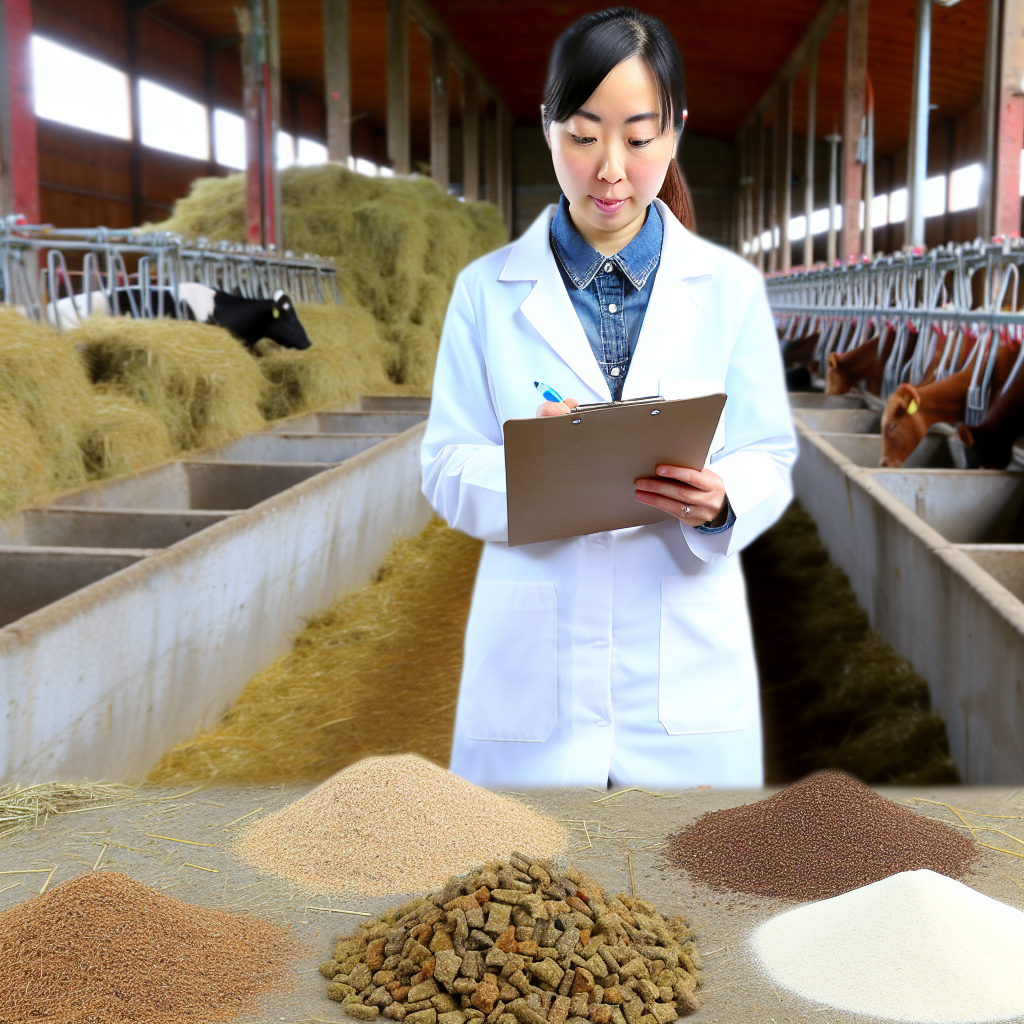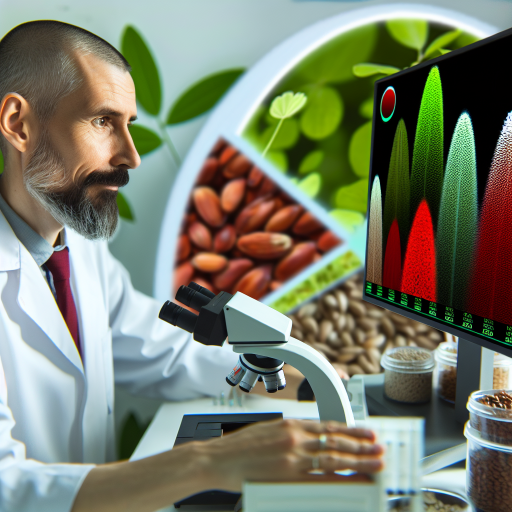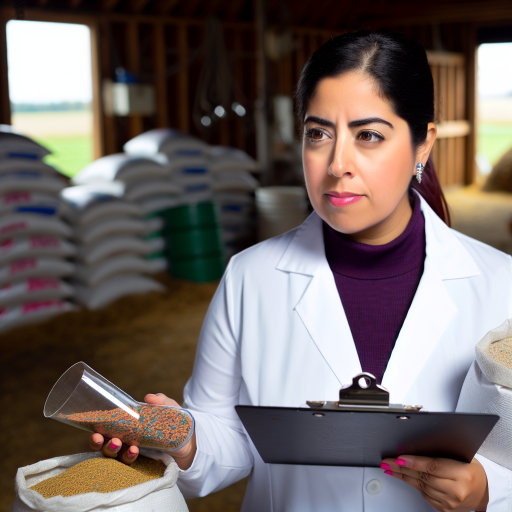Overview of the Role of a Livestock Nutritionist
A livestock nutritionist focuses on the dietary needs of farm animals.
They analyze and formulate balanced feed rations for various species.
These specialists ensure optimal growth and health of livestock.
Responsibilities of a Livestock Nutritionist
One key responsibility includes assessing the nutritional content of feed ingredients.
Additionally, they develop nutrition programs to enhance production efficiency.
They also monitor animal performance and health outcomes.
Furthermore, livestock nutritionists conduct research on feed formulations.
They work closely with farmers to implement dietary changes.
Essential Skills and Qualifications
A successful livestock nutritionist must possess a solid background in animal science.
Strong analytical skills are crucial for evaluating nutritional data.
Moreover, effective communication is essential for educating clients.
Experience in formulating rations for specific livestock species is beneficial.
Impact on the Agriculture Industry
Livestock nutritionists play a vital role in sustainable agriculture practices.
They help improve feed efficiency, reducing costs and environmental impact.
Additionally, their work contributes to animal welfare and productivity.
They ensure the health of the livestock population and food production quality.
Educational Requirements and Qualifications for Livestock Nutritionists in Canada
Essential Educational Background
A degree in animal science is typically required.
Many employers prefer candidates with a master’s degree.
Relevant areas of study include nutrition, biology, and agricultural sciences.
Courses in veterinary medicine can also be beneficial.
Certification and Professional Designation
Certification enhances job prospects for livestock nutritionists.
The Canadian Association of Animal Science offers valuable credentials.
Consider additional certifications from accredited organizations.
These demonstrate expertise in livestock nutrition and management.
Practical Experience Requirements
Employers often seek candidates with hands-on experience.
Unlock Your Career Potential
Visualize a clear path to success with our tailored Career Consulting service. Personalized insights in just 1-3 days.
Get StartedInternships during studies provide practical insight into the field.
Working on farms offers experience in animal husbandry.
Additionally, contact with commercial feed companies is useful.
Skills and Competencies
Strong analytical skills are crucial for evaluating nutrition needs.
Communication skills help convey complex information effectively.
Problem-solving skills are necessary for developing tailored nutrition plans.
Proficiency in relevant software for data analysis is beneficial.
Continuing Education Opportunities
Staying updated with industry trends is essential.
Participate in workshops and seminars for ongoing learning.
Online courses can help enhance specific knowledge areas.
Networking with professionals can provide insights and resources.
Key Skills Needed for Success in Livestock Nutrition Careers
Understanding Animal Physiology
A solid grasp of animal physiology is crucial for livestock nutritionists.
This knowledge helps in understanding how animals digest and utilize feed.
Moreover, it allows for tailored nutrition plans that meet specific needs.
Nutritional Science Expertise
A deep understanding of nutritional science is essential in this field.
This includes knowledge about vitamins, minerals, and macronutrients.
Consequently, professionals can create balanced diets for various livestock.
Data Analysis Skills
Livestock nutritionists must possess strong data analysis abilities.
These skills help in interpreting data from feed tests and animal performance.
As a result, professionals can make evidence-based nutritional recommendations.
Communication and Interpersonal Skills
Strong communication skills are vital for livestock nutritionists.
They need to effectively convey dietary recommendations to farmers.
Additionally, interpersonal skills foster collaboration with other agricultural experts.
Problem-solving Abilities
Able problem-solving skills are necessary in this career path.
Nutritionists often face challenges related to feed quality and animal health.
Thus, they must quickly develop effective solutions to these issues.
Continuous Learning Mindset
The field of livestock nutrition is constantly evolving.
Successful nutritionists stay updated on the latest research and technologies.
Moreover, they attend workshops and participate in professional development.
Discover More: Networking Opportunities for Seed Technologists in Canada
Job Market Trends and Demand for Livestock Nutritionists in Canada
Current Demand for Livestock Nutritionists
The demand for livestock nutritionists in Canada is steadily increasing.
With the growing awareness of animal nutrition’s role, the industry is evolving.
Farmers seek experts to optimize feed efficiency and animal health.
As a result, job opportunities are expanding across various provinces.
Industry Growth and Opportunities
The agriculture sector is experiencing significant growth in Canada.
This growth translates into more positions for livestock nutritionists.
Moreover, advancements in nutrition science create new roles.
Employers look for skilled professionals who can innovate animal feed solutions.
Regional Variations in Job Opportunities
Different provinces present varying levels of demand.
For instance, Alberta and Ontario exhibit high job openings.
Conversely, provinces like Newfoundland and Labrador show less demand.
Ultimately, job seekers should consider regional market conditions.
Qualifications and Skills Required
Most employers require a degree in animal science or nutrition.
Additionally, practical experience in livestock management is valuable.
Strong analytical skills enhance a nutritionist’s effectiveness in the field.
Furthermore, communication skills are essential for advising farmers.
Future Trends and Innovations
The livestock nutrition field is poised for future innovations.
Technological advancements will play a crucial role in development.
Precision agriculture techniques can refine feeding strategies.
As a result, professionals must stay updated on industry trends.
Explore Further: Common Seed Diseases and How Technologists Address Them
Potential Employers and Work Environments for Livestock Nutritionists
Agricultural Cooperatives
Agricultural cooperatives often seek livestock nutritionists.
These cooperatives provide valuable resources to farmers.
They focus on enhancing livestock health and productivity.
Moreover, they offer support in formulating feed rations.
Research Institutions
Many research institutions hire livestock nutritionists.
These institutions focus on advancing agricultural science.
They develop innovative feeding programs for livestock.
Additionally, they conduct experiments to understand animal nutrition.
Private Consulting Firms
Private consulting firms are another option for livestock nutritionists.
These firms provide specialized advice to farms and livestock producers.
They analyze dietary requirements and recommend supplements.
Consultants often help clients optimize feeding strategies.
Government Agencies
Government agencies also hire livestock nutritionists.
These positions can involve policy development and resource allocation.
Nutritionists may work on regulatory compliance regarding animal feed.
They might also engage in public outreach and education initiatives.
Feed Manufacturing Companies
Feed manufacturing companies actively recruit livestock nutritionists.
These companies formulate and produce animal feed products.
Nutritionists contribute to product development and quality control.
They ensure that feeds meet nutritional standards for livestock.
Livestock Production Facilities
Livestock production facilities employ nutritionists directly.
These positions often involve managing the health of large herds.
Nutritionists design feeding programs tailored to specific animals.
They monitor growth and adjust diets based on performance metrics.
Non-Profit Organizations
Non-profit organizations dedicated to agriculture may also hire nutritionists.
These organizations focus on sustainable practices and animal welfare.
Nutritionists help develop programs to support local farming communities.
They also conduct workshops and educational sessions for farmers.
Delve into the Subject: Tools and Equipment Used by Seed Technologists

Salary Ranges and Compensation Expectations for Livestock Nutritionists
Overview of Salary Expectations
The salary of livestock nutritionists varies across Canada.
Factors influencing pay include experience, education, and location.
On average, a livestock nutritionist earns between $65,000 and $95,000 annually.
Entry-level positions may start around $50,000, while seasoned professionals can exceed $110,000.
Regional Salary Differences
Salaries differ significantly across provinces.
For instance, livestock nutritionists in Alberta tend to earn higher compensation.
Ontario and British Columbia also offer competitive salaries.
Conversely, salaries may be lower in the Atlantic provinces.
Impact of Experience and Education
Experience directly correlates with salary increases.
New graduates may begin at the lower end of the salary range.
In contrast, professionals with over ten years of experience can command higher wages.
Advanced degrees, such as a master’s or Ph.D., typically lead to better salary offers.
Additional Compensation and Benefits
Many employers provide additional benefits to attract talent.
These benefits often include health insurance and retirement plans.
Some companies offer bonuses based on performance and company profits.
Relocation assistance may also be part of the compensation package.
Negotiating Your Salary
Understanding market rates helps in salary negotiations.
Researching local salary standards ensures informed discussions.
Professionals should evaluate their qualifications during negotiation.
Additional certifications can enhance bargaining power.
Discover More: The Role of Soil Scientists in Canada’s Sustainable Agriculture Movement
Professional Development and Certification Opportunities
Importance of Continuing Education
Continuing education enhances your expertise in livestock nutrition.
It keeps you updated on the latest research and techniques.
Furthermore, it helps in building a strong professional network.
Certification Programs
Certification is a key factor in advancing your career.
Several organizations offer reputable certification programs.
The Animal Nutrition Association of Canada provides valuable credentials.
Another option includes the Certified Livestock Nutritionist program.
These certifications improve job prospects and professional credibility.
Workshops and Seminars
Participating in workshops provides hands-on learning experiences.
Many universities and organizations host specialized seminars.
These events facilitate discussions on current industry trends.
They also allow networking with other nutrition professionals.
Online Courses
Many institutions offer online courses tailored for livestock nutritionists.
These courses provide flexible learning options to fit your schedule.
Additionally, they often cover diverse topics related to nutrition science.
Platforms like Coursera and edX have excellent options available.
Professional Associations
Joining professional associations can significantly benefit your career.
The Canadian Society of Animal Science is a key organization.
Membership offers access to exclusive resources and conferences.
Networking through these associations can lead to job opportunities.
Moreover, they often provide information on upcoming educational events.
Future Trends in Livestock Nutrition and Implications for Job Opportunities
Increasing Demand for Sustainable Practices
Farmers are shifting towards sustainable livestock nutrition practices.
This trend increases the need for knowledgeable livestock nutritionists.
Experts help optimize feed efficiency and reduce waste.
Moreover, they ensure animal health while minimizing environmental impacts.
Technological Advancements in Nutrition
Emerging technologies greatly influence livestock nutrition.
Data analytics and precision farming tools enhance feeding strategies.
Nutritionists must adapt to these technological changes to stay relevant.
Thus, job opportunities will likely increase for tech-savvy professionals.
Research and Development Growth
The livestock industry is increasingly investing in research and development.
New feed formulations and nutritional strategies are being explored.
Researchers play a crucial role in innovating livestock nutrition practices.
This growth will create more job openings in academic and corporate settings.
Global Market Opportunities
As global demand for livestock products rises, job prospects expand.
International trade increases the complexity of livestock nutrition.
Nutritionists with a global perspective will be highly sought after.
Additionally, understanding international regulations will be essential.
Focus on Animal Welfare
There is a growing emphasis on animal welfare within livestock farming.
Nutritionists contribute to developing feeding programs that support animal well-being.
Increasing consumer awareness drives this focus on ethical farming practices.
As a result, opportunities for livestock nutritionists may broaden significantly.
Collaboration with Other Disciplines
Livestock nutritionists are increasingly working alongside veterinarians and agronomists.
This interdisciplinary approach improves overall livestock management.
Collaboration skills will be valuable for future job candidates.
Employers will seek professionals who can cooperate effectively across fields.
Additional Resources
United States Department of Agriculture FY 2025 BUDGET SUMMARY




